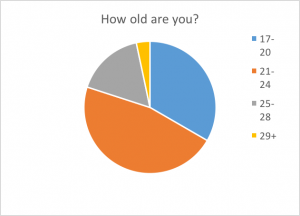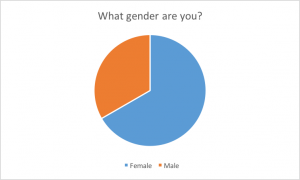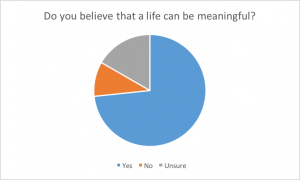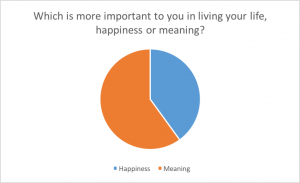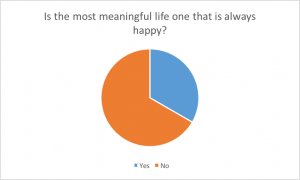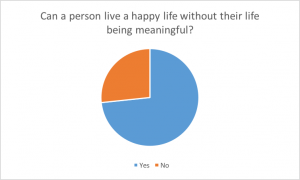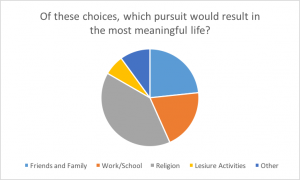In the search for the meaning of life, the subject of objectivity is one that comes into question. As Wolf states, “Meaning arises when subjective attractiveness meets objective attractiveness.” We as humans, when questioning on what exactly can be defined as a meaningful life, such as how May, Wolf, Taylor, and Keke, strive for a direct meaning, but I believe that a meaning in life is a very subjective matter. I conducted a half-survey, half-interview with a group of five peers who have different backgrounds. The study included people of differing genders, year in college, majors, family lives, and social economic statuses. The answers to the exact questions asked are as long as the participant wanted and went in any direction they wanted it to go in. Here they are listed.
| What do you define to be a meaningful life? | What do you define to be a happy life? |
| “Feeling a sense of accomplishments, connections and passion for life.” | “I would say a general sense of joy and gratitude and having a general positive attitude and optimism toward life” |
| “I would define it as investing in yourself and others and feeling connection. [And] doing things (as long as they don’t harm others) that are risky but help you grow and learn. I wouldn’t say meaningful is the same as happy, but it’s almost better than a happy life since it implies experiencing a much wider range of things.” | “I wrote a medical blog post on happiness so my answer is influenced by that. I’d say being thankful and practicing seeing the good. I think it takes some effort or will to have a happy life, but it’s accessible. I would also include laughing every day.” |
| “A life that had purpose and was filled with adventure, learning, and love.” | “A life where I felt supported and I supported others to achieve things.” |
| “Hmm. I’d say one where you add something good to the world. Some type of knowledge, beauty, kindness, etc. that leaves other people better off than they would have been.” | “One where I’m able to grow, make mistakes, and pursue what I want to do with the support of people that care about me and without feeling wrong or guilty for doing so.” |
| “Having a positive impact on other people.” | “Having a positive impact on other people.” |
May’s definition follows that people are engaged in a project, no matter the success or morality of it, unless that person lives an overall immoral lifestyle. This can detract from one’s meaning. May also believes in the use of narrative values, or values that describe one’s life in one word as if it were a story, such as courageous, generous, spontaneous, or intellectual. While Wolf has a very objective method of what meaning should be, May’s stand takes a very subjective route, as do many of the participants.
Looking at the data for the question of what a happy life was, three participants claimed that a happy life still required active engagement in some way shape or form, one participant stated their exact answer for the definition of a meaningful life, and two suggested that a happy life was exclusively due to how they felt about their life. May states “we feel the need to have our lives ratified from some perspective that isn’t just that of our own happiness. … It is something outside of me that lends my life significance,” which aligns with the participants’ answers. All answers given from had at least at one point suggested that something outside of them, such as helping others or feeling accomplished (about some goal) or having a “purpose” is what created meaning for them.
